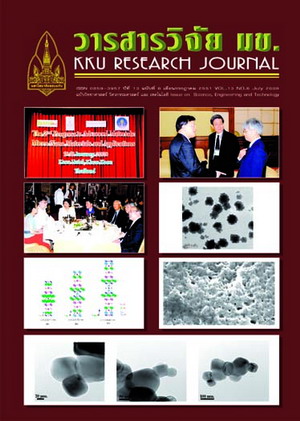Graft Copolymerization of methly methacrylate onto natural rubber perpared by emulsion polymerizations (Thai)
Main Article Content
Abstract
The grafting efficiency of the methyl methacrylate (MMA) monomer onto natural rubber was studied.
The effect of the synthesis variables such as the type of initiators and amount of initiator on the grafting
efficiency and conversion were investigated. Structures and properties were characterized by FT-IR spectroscopy and their thermal behavior was studied by thermogravimetric analysis. It was found that the grafting efficiency of grafted copolymer using potassium persulphate as initiator higher than that using cumene hydroperoxide. In addition, 0.5 mole% of potassium persulphate gave highest level of grafting efficiency for range of the amount of the initiators in this study. Thermal properties of grafted copolymers are better than that of poly(methyl methacrylate)(PMMA) and natural rubber. The appearance of 1722 and 826 cm
-1 bands in the FT-IR spectra of the grafted copolymers indicated that MMA had been successfully grafted onto natural rubber.
The effect of the synthesis variables such as the type of initiators and amount of initiator on the grafting
efficiency and conversion were investigated. Structures and properties were characterized by FT-IR spectroscopy and their thermal behavior was studied by thermogravimetric analysis. It was found that the grafting efficiency of grafted copolymer using potassium persulphate as initiator higher than that using cumene hydroperoxide. In addition, 0.5 mole% of potassium persulphate gave highest level of grafting efficiency for range of the amount of the initiators in this study. Thermal properties of grafted copolymers are better than that of poly(methyl methacrylate)(PMMA) and natural rubber. The appearance of 1722 and 826 cm
-1 bands in the FT-IR spectra of the grafted copolymers indicated that MMA had been successfully grafted onto natural rubber.
Article Details
How to Cite
Budchar, P., Ruksakulpiwat, C., & Khansawai, P. (2017). Graft Copolymerization of methly methacrylate onto natural rubber perpared by emulsion polymerizations (Thai). Asia-Pacific Journal of Science and Technology, 13(6), 663–668. retrieved from https://so01.tci-thaijo.org/index.php/APST/article/view/83678
Section
Research Articles
References
-


